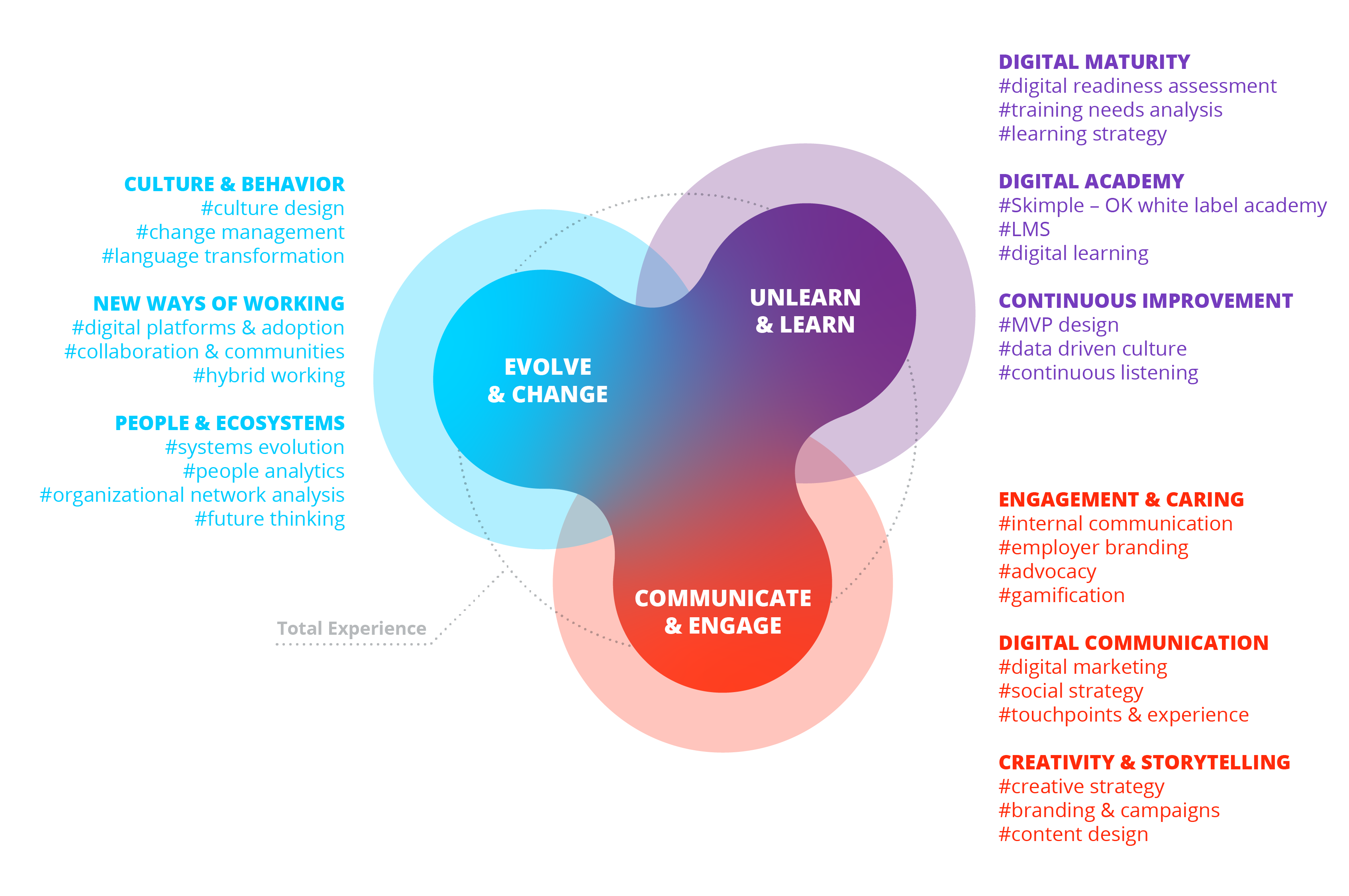Words, Signs, Culture
Redesigning the total experience of organisations through language
At OpenKnowledge we have always been aware that the internal and external dynamics of organisations are in constant interaction and strongly influence each other. We discuss this in the December 2022 issue of HBR Italy’s “Words, Signs, Cultures” supplement: the Customer and Employee dimensions express two different perspectives that coexist in a single system, in a dynamic that has been captured in the definition of Total Experience. With this term, Gartner identifies a corporate strategy designed to break down silos and simplify the customer experience process. It is based on delivering an exceptional experience to everyone who interacts with a brand, both internally and externally, by leveraging on the User Experience and the concept of Multi-experience, meaning an access from multiple channels, each of which adds a unique piece to the system. In a Total Experience strategy, data and business processes are collected in an integrated way and allow analysis to be fed back to the end user, creating value.
It is therefore a matter of adopting a holistic perspective, taking into account the continuity of the system as a whole and the specificity and uniqueness of each contribution to the creation of the experience. To do this, and to be able to intervene positively in this dynamic, it is necessary to adopt new tools, capable of offering new viewpoints and powerful transformation levers.

Language as a tool
Starting from these considerations, we decided to carry out a reflection on language and its role within organisations. Looking at our direct experience, both with the companies we collaborate with and internally at OpenKnowledge, we have developed the conviction that language is an agent of transformation for organisations, a force that can make a crucial contribution to the orchestration of a positive and effective Total Experience.
Our reflection identifies three functions of language in the organisational sphere:
- Codification of reality
- Communication of messages
- Generation of experience and impact
Language as culture
A first crucial role of language is that of participation in the construction of reality as we know it. In this sense, language for us materialises in distinct forms, which have a point in common: they contribute – in a process of mutual influence – to the determination of the corporate culture. Relevant forms of language for us in this sense are symbols as well as behaviours, offices as well as company posters, because they all tell the culture and from the use of all of them the culture is created, transformed, evolves.
Language as communication
The second role of language that we identify is that of communicating messages. Apparently it is the most intuitive, but behind the simplicity of this association we have found new meanings, also turning our gaze inward. This is how, for example, we came to question the role of memes in internal communication, reflecting on our own experience and ways of communicating between colleagues. Widening our perspective also meant reflecting on new codes, on emerging forms of language that we need to be aware of and know how to use.
Language as action
The third role of language that is important for us to address is that of experience generation. In the context of Total Experience, this function is fundamental: language can, for example, have an inclusive or exclusive function, depending on how one decides to use it. Likewise, language is a fundamental tool for generating coherence in the orchestration of the organisation’s experiences, while also ensuring that these experiences are distinctive, unique.
Language as a perspective
Our research therefore leads us first of all to an exploration of language as a tool. But through our reflections, through the examples and stories we have been able to tell, language also becomes for us a lens for interpreting reality, a point of observation from which to examine the issues to which organisations are called upon to answer today: the emergence of Generation Zeta in the labour market, support for diversity and inclusion policies, attention to sustainability that is not only environmental but also social and economic, new ways of working and new balances that companies must build with their employees. This perspective helps us to capture new nuances, opening up new spaces of interpretation and action for our work.
Language as a starting point
We see this research as the beginning of a journey, the possible start of a dialogue that we want to engage in with those who read us. We believe that the exploration of language and its transformative power is an opportunity for organisations to reflect on their work and the change they wish to bring about. In today’s complex context, knowing and mastering the dynamics that drive the use of language in organisations becomes a strategic lever for companies, a necessary tool to govern experience and change. Through the narration of our experience and the use of the most suitable tools to explore the impact of language, we place ourselves at their side to embark on this path of evolution together.

 13 December 2022
13 December 2022
